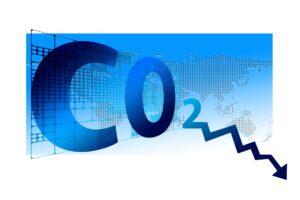Assessing the true value of companies’ green efforts is difficult
It is becoming more and more important for market players to achieve net zero emissions by 2050, as set out in the Paris Climate Agreement. Accordingly, companies communicate more and more often about their plans for achieving carbon neutrality, but often make their commitments with little relevant data. It is difficult for them to see the extent of their expenses related to zero emissions, and most companies do not have nearly enough resources for the investments necessary to achieve the goal. The uncertain economic environment and the short-term decisions that are becoming more frequent as a result present additional obstacles for companies to achieve long-term results, according to Baker McKenzie’s recent international survey of 1,000 managers.

(Photo: Pixabay)
It is difficult for companies to assess their real environmental footprint, because – even if they monitor their own activities – there is usually very little information available to them about the actors in their supply chain. 41 percent of the interviewed company managers stated that they have no insight into the real emissions of their company, and 40 percent of them are currently being investigated in order to determine this. An organization alone cannot obtain a sufficient amount of relevant information about its environmental footprint. If they consistently strive to achieve zero emissions, it is essential to involve other actors in the chain, such as suppliers ¬.
The problem of the extended supply chain
The extent of the network most often hinders companies from achieving a significant result in reducing their emissions: according to two-thirds of the respondents, the biggest challenge would be to switch the entire supply chain to zero emissions. The process would entail significant costs, which is a problem for 70 percent of the responding companies to cover the expenses necessary to achieve the goal, and 58 percent do not have nearly enough resources for the transition.
At the same time, large companies must be ready to review their extensive supply chain, if the European Union accepts the so-called regulation on the internal screening of companies. CS3D directive. Pursuant to the directive, large companies meeting the conditions contained therein will be obliged to create an internal due diligence policy, based on which they must identify the actual and potential harmful environmental effects resulting from their activities and long-term business relationships.
“The actual value of a company, its attractiveness to investors, and its financing can be significantly influenced by the company’s compliance with ESG requirements. However, it cannot be emphasized enough that the acronym does not only include environmental protection requirements, so it is definitely recommended for a company to review its supply chain not only from a sustainability point of view, but also to assess how it affects the company’s assessment of corporate governance or social responsibility, if among other things, it does not conclude contracts of fundamental importance for the operation of the company with diligent market players.” explains dr. Dániel Orosz, lawyer at Baker McKenzie.
Inaccurate calculations
Emissions mitigation is generally an underfunded area for companies, often because they cannot accurately calculate how much they are spending to reduce their carbon footprint. In most cases, only estimates are available for this: based on the opinion of the managers interviewed in the survey, this expenditure represents an average of 5.8 percent of expenses.
Business leaders – as emissions are an increasingly pressing problem – often communicate their sustainability efforts, but in a significant number of cases, the respondents who took part in the survey do not feel that these statements are consistent. One in four of the interviewed managers stated that their company might not be able to keep its commitments regarding emission reduction, and according to about half of them, the management’s statements were overly optimistic. 23 percent of those surveyed claim that they do not disclose their emission goals due to the risk of litigation.
Uncertain economic environment
Company managers expect rising costs and a changing market environment, so it is much more typical for them to make decisions in the shorter term. Since the transition is a long-term plan, it is typically difficult to calculate costs in an uncertain economic situation.
The situation is increasingly urgent, but the companies participating in the survey have so far taken few significant steps in order to achieve zero emissions. Most managers perceive the importance of the problem, but only 38 percent of the surveyed companies have a sustainability strategy. However, according to 72 percent of the respondents, such a strategy would be necessary in order to define and implement ambitious plans.
Related news
Related news
Discover the solutions of the future on Startup Island! (Part 3)
🎧 Hallgasd a cikket: Lejátszás Szünet Folytatás Leállítás Nyelv: Auto…
Read more >Burger, condom and red rose: this is what Valentine’s Day is like at Wolt
🎧 Hallgasd a cikket: Lejátszás Szünet Folytatás Leállítás Nyelv: Auto…
Read more >Home Start loan: MBH Bank has raised the stakes
🎧 Hallgasd a cikket: Lejátszás Szünet Folytatás Leállítás Nyelv: Auto…
Read more >









